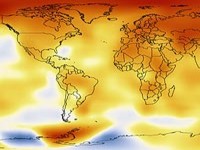Shutting the door on 'Climategate'
 Global warming is ‘real’ and temperatures have climbed
Global warming is ‘real’ and temperatures have climbedsteadily over the past decades, a long-awaited, independent study
has found, refuting sceptics’ claims that there isn’t enough
evidence to assert that the world climate is changing.
According to a
study published this week by the
Project, which includes US physicists, climatologists and
statisticians, the average world land temperatures climbed
approximately 1 degree Celsius since the mid-1950s.
The Berkley project, funded among others by the Koch Foundation,
linked to the company which Greenpeace called a ‘kingpin of climate
science denial,’ has analysed data from 15 different sources, in
some cases going back as far the 1800. That makes it the most
complete historical record of land temperature ever compiled, said
physicist and head of the project, Richard Muller.
“My hope is that the findings will cool
the debate over global warming by addressing many of the valid
concerns of the sceptics in a clear and rigorous way,” Elisabeth
Muller, co-founder and executive director of the Berkley Earth
project.
Much of the concerns over available and reliable data were
fuelled by the so-called Climategate scandal, which started in 2009
before the Copenhagen climate conference, with the hacking of
roughly 1,000 emails from a server at the University of East
Anglia’s Climatic Research Unit, one of the leading centre
providing data to the Intergovernmental Panel on Climate Change
(IPCC).
Climate sceptics alleged that the emails revealed scientists
were manipulating data and that global warming was a scientific
conspiracy, while in fact they seemed to express more a
genuine exchange of ideas.
The more than one billion temperature records, compiled by the
Berkley Earth project’s scientists, in fact agree with figures
already collected by other scientists in the US and the UK and
spelled out in previous studies, carried out by the US National
Oceanic and Atmospheric Administration (NOAA) and the Nasa’s
Goddard Institute for Space Studies and the Met Office’s Hadley
Centre with the University of East Anglia.
“Our biggest surprise was that the new results agreed so closely
with the warming values published previously by other teams in the
US and the UK,” Muller said. “This confirms that these studies
were done carefully and that potential biases identified by climate
change sceptics did not seriously affect their conclusions.”
Ahead of the Durban climate conference in December, the Berkley
group decided to use alternative methodologies to find convincing
arguments addressing sceptics’ concerns primarily on urban heat
island effect, poor weather stations quality and the risk of data
selection data.
The Berkeley group surveyed about 40,000 weather stations around
the world whose output has been recorded and stored in digital
form.
According to the Berkley project’s leading scientist,
Robert Rhode, urban heat does not contribute significantly to the
average land temperature rise, because urban regions amount to less
than 1% of the global land area.
Still, two-thirds of the weather stations reported warming of
land temperatures over the last 70 years, while only one-third of
sites, the bulk of them in Europe and the United States, reported
cooling temperatures.
“The large number of sites reporting cooling might help explain
some of the scepticism of global warming,” Rhode said, adding that
it is very hard to measure weather consistently over decades and
the presence of sites reporting cooling temperatures can falsify
data.
This is why it takes hundreds of stations to detect and measure
an average warming, work that was done by the California University
scientists.
target=”_blank”>Read more
Source: www.euractiv.com

